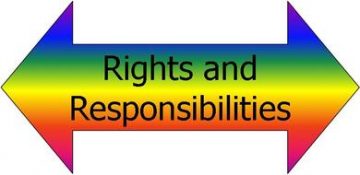One of the most common questions I receive from people has to do with rewarding students. In fact, a common thinking is that it is necessary to reward students to do what you would like them to do. Additionally, most people still compare rewarding students with adults receiving a paycheck to do a job. But the two concepts are completely dissimilar.
For working adults, money is a satisfier—not a motivator and not a reward. Your compensation is a binding contract between two entities. “You do this task and I’ll give you this much money.” If either party fails to do their part, the contract can immediately end. Either you quit the job (if you don’t receive your income) or you … >>>
READ MORE >>> →





 What are our children’s rights and responsibilities? We all want our children to be responsible at home and at school. And children certainly feel that they have rights. What is often overlooked, though, is how intertwined rights and responsibilities are. In fact, you can’t have one without the other. That’s why it’s important for young people to understand that their rights are often accompanied by responsibilities, and they need to know what each is specifically.
What are our children’s rights and responsibilities? We all want our children to be responsible at home and at school. And children certainly feel that they have rights. What is often overlooked, though, is how intertwined rights and responsibilities are. In fact, you can’t have one without the other. That’s why it’s important for young people to understand that their rights are often accompanied by responsibilities, and they need to know what each is specifically. Praise is patronizing, so stop praising students. Praise also has a price. It implies a lack of acceptance and worth when the youth does not behave as the adult wishes. Using a phrase that starts with, “I like,” encourages a young person to behave in order to please the adult. By contrast, acknowledgment simply affirms and fosters self-satisfaction in the young person.
Praise is patronizing, so stop praising students. Praise also has a price. It implies a lack of acceptance and worth when the youth does not behave as the adult wishes. Using a phrase that starts with, “I like,” encourages a young person to behave in order to please the adult. By contrast, acknowledgment simply affirms and fosters self-satisfaction in the young person. Asking reflective questions is the key ingredient to making interactions with youth less stressful. Whether you are a parent, teacher, or someone who interacts with children on a regular basis, you’ll find that reflective questions reduce tension, defuse frustrating situations, and promote responsible thinking in youth.
Asking reflective questions is the key ingredient to making interactions with youth less stressful. Whether you are a parent, teacher, or someone who interacts with children on a regular basis, you’ll find that reflective questions reduce tension, defuse frustrating situations, and promote responsible thinking in youth.